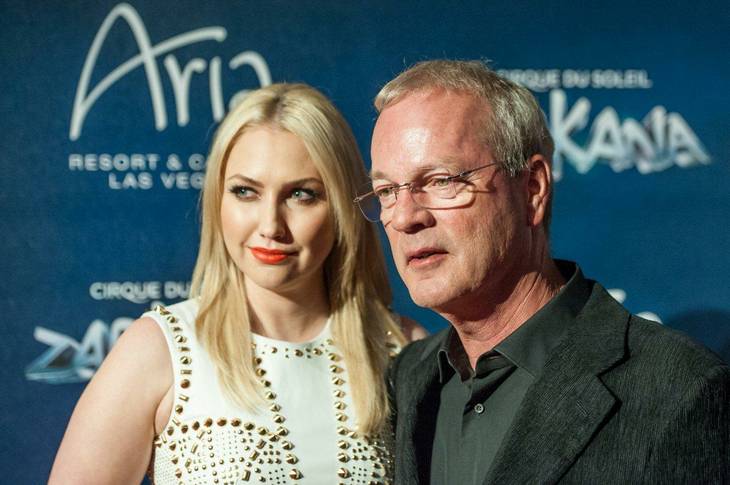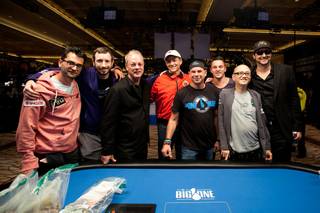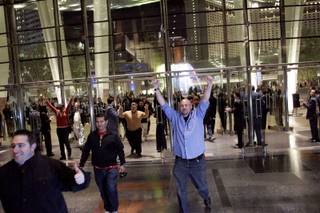They call him “The Owl.”
Makes sense. Look into Bobby Baldwin’s stone-cold eyes at a card table and you’ll likely struggle to get a read on the hand he's holding. And if you’re at the table long enough to get a whiff of Baldwin’s calculations, the poker pro’s likely figured you out.
Baldwin drew attention to himself when he became one of the youngest players ever to win the World Series of Poker.
That’s also how the Tulsa native caught the attention of Steve Wynn, who hired him as a casino consultant in 1982. For the next 18 years, Baldwin stood with Wynn through the building of the Mirage, Treasure Island and the Bellagio.
But when MGM Resorts bought the Mirage and Wynn went on his own to build a resort in his name, Baldwin stayed. He later landed in a swank office at the Aria as president of CityCenter. The humongous development recently launched MGM from red to black with record earnings in the first quarter of 2013.
Baldwin recently sat down with the Las Vegas Sun and VEGAS INC to discuss how his play on the poker table has overlapped his role as boss of the boardroom.
When did you get into poker?
I got into it very young, at 12 or 13 years old. I had a neighbor who was trying to teach me to play poker — so he could win my paper route money. He did that successfully several times for several months until I finally learned how to defend myself.
How has poker helped you in your job as president of CityCenter?
Poker is not a game of cards; it’s a game of people, just like business. People who think a poker game is a game of cards — we call them losers because they usually lose. You have to understand the people. You have to understand the players. Business is mostly about personnel and understanding the players, which are your employees and customers. Understanding people is everything, whether in a card game or a business.
How long did it take you to figure that out?
I’m still working on it. It’s a lifelong job to understand people. But I figured out early on that poker’s a game of people and not cards, and I’ve known that for a very long time. In a card game, everybody more or less gets the same amount of good hands and bad hands because they’re randomly dealt and randomly generated. But if you’re in an eight-handed card game, each of the eight players responds to the hands differently, even though we all more or less get the same cards. They have hands they don’t know what to do with. They don’t know whether to fold, bet and so on. About two-thirds of the hands nobody can play because they’re just junk hands. But the third of the hands that they’re likely to play, they all play very differently. Each one of them plays the same hands differently. There is a correct way to play a hand, and not many people know how to do that. Most people learn, not through books or computer programs, but through experience. You’ve been in this situation so many times, you’re tired of losing in this situation, so you change your strategy with that particular hand in that particular circumstance — just like business. We’re in this for a profit and the benefit of our stakeholders. And if we’re doing things that we’re losing at, and we can’t justify it, we have to stop it or change it or improve it. And that’s what you do when you’re trying to manage your card game.
Do your co-workers comment about your poker roots?
Everybody knows I play poker. People get to expect what it is that I want when I talk to them about business. It works out pretty well.
On what occasions do you play these days?
I play occasionally in the World Series of Poker, which is coming up in a few weeks, and I play occasionally here.
What’s your take on online poker?
I think online poker is going to make it in one form or another. Right now it looks like it’ll go state by state, and it’s going to be difficult to have the economies of scale to be profitable on a state-by-state basis without state compacts or federal legislation. We’ll see how it evolves. There’s obviously a big market for it. The question is: Is it going to be so segmented that it’s impossible to create a successful business?
Do you have any interest in playing online poker?
I don’t have any interest in playing online poker. You can’t see who you’re playing. It’s like saying you want to take a drive blindfolded. And I’m in the card game to interact with human beings, not a computer screen. It’s just never interested me. Most people who play online poker play low stakes and in the millions of players. I don’t play low stakes. They play low stakes all the time. When I play, I play rarely, but I play at much higher stakes.


